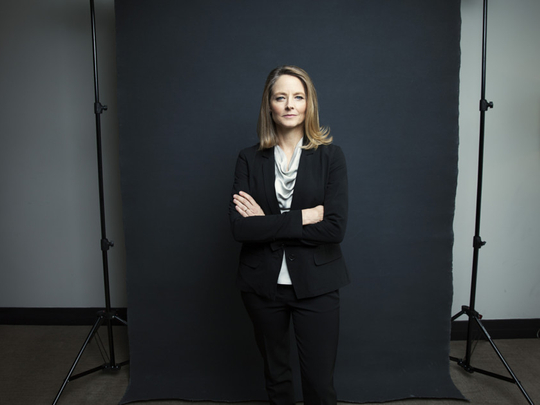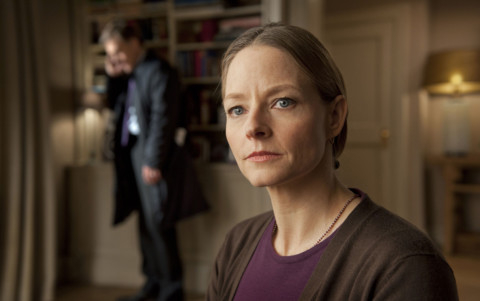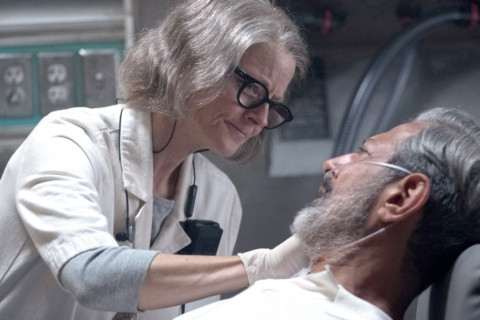
Over the course of her 52-years-and-counting career, her roles have included a child prostitute, an FBI agent, a feral woman in the woods, a scientist who communicates with aliens, a mother searching for her missing child and, perhaps most notoriously, a woman whose husband can only communicate via a beaver puppet, so you can’t really say there is a typical Jodie Foster role. There is, however, a typical Foster expression. Think of Foster on screen and it’s likely that you picture her staring furiously ahead, her lips thin, every nerve radiating rigid control. And given Foster’s own life, that seems apt.
Seriously, imagine how much self-control you would need to survive a life like Foster’s and still be functional. To come through childhood megastardom unscathed and to keep going after a man tries to assassinate the president because, he says, he was trying to impress you. To then determinedly make the shift into adult roles by taking on characters others advise you not to because they are deemed too risky, including that of a brutally raped woman in The Accused and Clarice Starling in The Silence of the Lambs, both of which won Foster Oscars.
Through all this, Foster stayed silent during the decades of speculation about her sexuality, only to come out at 51 exactly as she wanted, in a speech at the Golden Globes in which she confirmed she was gay and laughed at the idea she owed it to the public to come out to them. “I hope you’re not disappointed that there won’t be a big coming-out speech tonight, because I already did my coming out about a thousand years ago back in the stone age ... But now I’m told, apparently, that every celebrity is expected to honour the details of their private life with a press conference and a primetime reality show. I’m sorry: that’s just not me,” she said. No one can push Foster off the path she has chosen.
I feel like I was blessed with a strength of character that keeps me intact. Although there are definitely parts of me that are crazy.”
“I think you’re just born with a certain personality and some people might want to be astronauts and no matter how good they are at flying they can’t handle the zero gravity,” Foster tells me when I ask about her self-control. “I feel like I was blessed with a strength of character that keeps me intact. Although there are definitely parts of me that are crazy.”
Images of Foster staying up all night, knocking back tequila and dancing to EDM are now running through my head, so I ask for details of this craziness. “Well, I think a lot of people would say I’m a control freak,” she says. So, the way you’re convincing me that you’re not totally self-controlled is by telling me you’re a control freak? She laughs. “There are neurotic things, I promise!” Like what? “I have a magical thinking that I can cope with anything, which isn’t too healthy,” she says. Again, this sounds like another way of describing self-control, but it seems unfair to tease Foster for having the quality that has made her life possible.
Foster and I are talking by phone while she is driving from a lunch meeting to her home in Los Angeles. It has been a day of phone mix-ups, with Foster twice not calling at arranged times before at last getting through. But instead of doing what most megacelebrities would in these circumstances — not mention it or blame someone else — she spends the first 30 seconds of our chat apologising for the “snafu” and taking responsibility for “having the incorrect phone number — I am so sorry”. There is a pleasing straightforwardness to Foster that, I imagine, at times did not help her in Hollywood, but has, in the long run, worked in her favour.
The reason we are talking today is that she is starring in a sci-fi action movie, Hotel Artemis, her first acting job in five years, since she co-starred with Matt Damon in Elysium. In the interim, she has directed a movie (Money Monster, starring George Clooney and Julia Roberts) and several TV episodes, including two of Orange Is the New Black, one of House of Cards and another of the last series of Black Mirror.
“Being in your 50s [Foster is 55] is a transitional period for actors — you’re not old enough to play the old characters and not young enough to play the young ones, so I felt like, OK, this is my time to direct,” she says.
Doesn’t she find that frustrating? Actors don’t go through that transition, only actresses. “Mmm, I don’t know if that’s not the case with men,” she says. Really? “It’s just what happens — it’s normal. There are just not that many roles for this age. But I anticipated it and I feel like I made hay in my younger years and I can express myself by directing. But once in a while something original comes along that isn’t just another franchise,” she says.
Hotel Artemis is certainly original. Foster plays a nurse with a snappy Barbara Stanwyck style of talking (“That was a lot of fun!”) who runs a secret hospital for criminals, played by Jeff Goldblum, Sterling K. Brown, Charlie Day and Sofia Boutella. It’s a fun movie, although it collapses into total illogicality towards the end, but much of the talk about the film has focused on Foster’s appearance: she has been aged to look at least 20 years older. I ask her if it’s true that she had to fight the director to let her do this.
“I understood it. When you make a bold choice, you’re always having to fight for it, and that’s been true of so many of the characters I’ve played, such as in The Accused. Some of the decisions I made when playing that character scared people,” she says.
Is that because filmmakers underestimate what audiences want to see? “I think they’re just scared because they don’t understand the creative process, and that’s OK,” she says. “Once I talked this decision through with the director, he was fine about it.” But the director — Drew Pearce — wrote the script. Was her character not 70 in the script? Foster pauses, as if she has been caught a little off guard. “No, no, it was in the script. They just got scared when they saw the makeup tests. I think they preferred ... no, they wanted to make sure the audience wouldn’t be jarred. But I go through this on every movie.”
Hollywood has long had a horror of women not looking sexy on screen, yet in her career Foster has never worn a slinky dress for no reason or done an action movie in absurdly high heels. Her most famous movie outfit is probably the brown blazer, jeans and belt she wore in The Silence of the Lambs. Hotel Artemis inadvertently emphasises how rare this is for a female actor, because while Foster is running through the hotel’s corridors with her grey hair and fake wrinkles, the only other actress in the movie, Sofia Boutella, is, for no obvious reason, wearing a skimpy ballgown and minxy makeup. Doesn’t that kind of nonsense bug Foster?
“No, no, I think Sofia’s dress is part of her character,” she says. She’s playing an international assassin! “Well, in the original script she was at an art event beforehand, so there was a reason for it,” she says, still determinedly not taking a stance. But come on: you’ve never worn anything like that in any of your films. “No, but Sofia’s career and mine are very different. She came up in the fantasy realm, whereas mine was a bit more grounded in reality. So there are different references,” she says.
Foster famously avoids making political statements and repeatedly during our chat she slips away from any potentially controversial comments like a cat in the night. When I ask how it has been living in the US under Trump, she says, “We’re living in a very strange time globally,” which is certainly true, but not exactly a response. I ask if the #MeToo movement — which, in many ways, The Accused anticipated more than 30 years ago — has changed Hollywood. “There has been a new consciousness. It will be interesting to look back on this time historically,” she replies. Whoa there, Jodie, coming on pretty strong, ain’tcha?
Clearly, Foster has opinions, but her lifelong refusal to share them is another sign of her self-control. As she said at the Golden Globes, she will not play the celebrity game of doing what’s expected of her if she doesn’t want to. Unexpected proof of that has been her friendship with Mel Gibson, and her casting of him in The Beaver, which she directed, long after he became persona non grata in Hollywood after multiple racism, antisemitism and sexism scandals.
“I love him, and when you have a friend who you love, you support them through their struggles,” she says. He’s had a lot of struggles, I say. “Yes, a lot of struggles, and he has to live with the consequences of his actions, and he would say the same thing.” She knows you probably disapprove of this — she knows most people do. But she does not care.
Foster was born in LA, the youngest of three children. Her parents divorced before she was born and she started working when she was three years old, when she was cast instead of her brother, Buddy, in a suntan lotion commercial. (Buddy later wrote a tell-all book about the family in the 1990s, prompting Foster to release a rare statement, referring to him as “a distant acquaintance”: “Buddy has done nothing but break [our mother’s] heart his whole life.”)
Her talent was immediately apparent, most obviously as the child prostitute in Taxi Driver, for which she got her first Oscar nomination. Robert De Niro was so struck by her skill that he took her under his wing during filming; she credits him with teaching her about the “craft of acting”.
She almost never played the kind of cutesy roles associated with child actors. Instead, she took on tough characters: the singer and moll in Bugsy Malone; the mysterious loner in The Little Girl Who Lives Down the Lane. After studying at Yale, where she was stalked first by John Hinckley Jr, who tried to assassinate President Reagan, and then by Edward Richardson, who said Hinckley ordered him in a dream to finish what he started, she continued in this vein in adulthood. She has never played “the girlfriend” or “the wife” — “Right,” she says emphatically when I say this to her — instead always going for complicated, challenging characters.
“I was never interested in a career for a career’s sake. I just wanted to tell the stories I find interesting and I wasn’t very good playing the girlfriend, so, nope, I never did that. I just worked when I found something that moved me,” she says.
Presumably that wasn’t too often, given the scarcity of interesting roles for women. How many times does a script turn up with a female FBI agent chasing a serial killer with the help of a cannibal? “It’s true, I probably worked less than others, but I’d rather be more discerning. The industry has changed a lot recently, with the end of the studio system, the rise of superheroes and streaming. But the only thing I trust is the quality of stories, and I decided I would focus on that. Some of my movies haven’t worked, but at least I held to the same principle. That’s why I’m not the richest actor, or the most successful. But I think I’ve had the longest career,” she says.
Foster’s mother, Brandy, guided her daughter’s career through childhood and the two have a close relationship. Foster says it’s only now that she has “a fuller appreciation” of how her mother protected her in the industry and helped her to transition to being an adult actor. Her mother now has dementia, but Foster says cheerfully: “She’s actually doing great — she’ll outlive us all. She can fully enjoy her two favourite activities: eating and watching movies.”
Yet, as much as Foster puts a cheerful spin on her childhood, her work has occasionally expressed some ambivalence. The first feature film she directed, Little Man Tate, was about a child prodigy who suffers horrendous emotional anguish because he feels torn between his ambition to fulfil his potential and his desire to be a normal kid. “Yeah, I was working through something on that movie, and Little Man Tate feels autobiographical to me,” Foster says.
Whereas in Little Man Tate the mother, played by Foster, wants her child to have a normal life, Foster’s mother wanted her to work. You must have felt under extraordinary pressure and in huge conflict with yourself as a child, I say.
“I feel that every day of my life! Struggling with being a daughter who wants to take care of her mother, and a woman who wants to grow away. Arkangel — Foster’s episode of Black Mirror, in which a mother uses a chip to track her daughter’s movements — “has a lot of biography in it, too, with mothers and daughters”.
Foster says she feels “maternal” towards other child stars, especially ones she acted with, including Kristen Stewart, Seth Green and Claire Danes. “We have a special handshake other people don’t understand, and I’ll seek them out when they’re having a tough time. You know what it’s like.”
Foster made the firm choice not to put her own children on the stage. She had two sons, Charlie, 20, and Kit, 16, while she was with her former partner, Cydney Bernard (Foster is now married to the photographer Alexandra Hedison), and she says keeping them out of the spotlight was “a conscious decision”. “I know the perils of having a parent involved in your art form are too great. My older son is getting more interested in acting now, and I’m glad he discovered it late. My younger son is really shy and I can promise you he will never be an actor,” she says proudly.
At the moment, Foster has no forthcoming projects — and she’s totally fine with that. “I like to wait,” she says. “And you know, I’m super-excited to be acting in my 60s and 70s. I think the roles will be so much more interesting!” And she lets out a decidedly carefree, unrestrained laugh.
–Guardian News & Media Ltd












